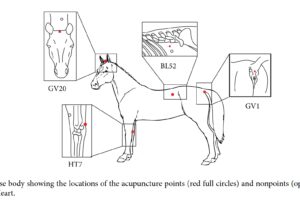Medical Research
Acupuncture improves startle/HRV in Horses
Kristen Sparrow • October 03, 2015


Nice study showing that acupuncture reduces the stress levels in response to startle response in horses. Apparently, their behavior didn’t change, but it would still be advantageous not to have the deleterious spike in their “fright and flight” physiological response.
Evid Based Complement Alternat Med. 2015;2015:219579. doi: 10.1155/2015/219579. Epub 2015 Aug 30.
Acupuncture Affects Autonomic and Endocrine but Not Behavioural Responses Induced by Startle in Horses.
Abstract
Startle is a fast response elicited by sudden acoustic, tactile, or visual stimuli in a variety of animals and in humans. As the magnitude of startle response can be modulated by external and internal variables, it can be a useful tool to study reaction to stress. Our study evaluated whether acupuncture can change cardiac autonomic modulation (heart rate variability); and behavioural (reactivity) and endocrine (cortisol levels) parameters in response to startle. Brazilian Sport horses (n = 6) were subjected to a model of startle in which an umbrella was abruptly opened near the horse. Before startle, the horses were subjected to a 20-minute session of acupuncture in acupoints GV1, HT7, GV20, and BL52 (ACUP) and in nonpoints (NP) or left undisturbed (CTL). For analysis of the heart rate variability, ultrashort-term (64 s) heart rate series were interpolated (4 Hz) and divided into 256-point segments and the spectra integrated into low (LF; 0.01-0.07 Hz; index of sympathetic modulation) and high (HF; 0.07-0.50 Hz; index of parasympathetic modulation) frequency bands. Acupuncture (ACUP) changed the sympathovagal balance with a shift towards parasympathetic modulation, reducing the prompt startle-induced increase in LF/HF and reducing cortisol levels 30 min after startle. However, acupuncture elicited no changes in behavioural parameters.

